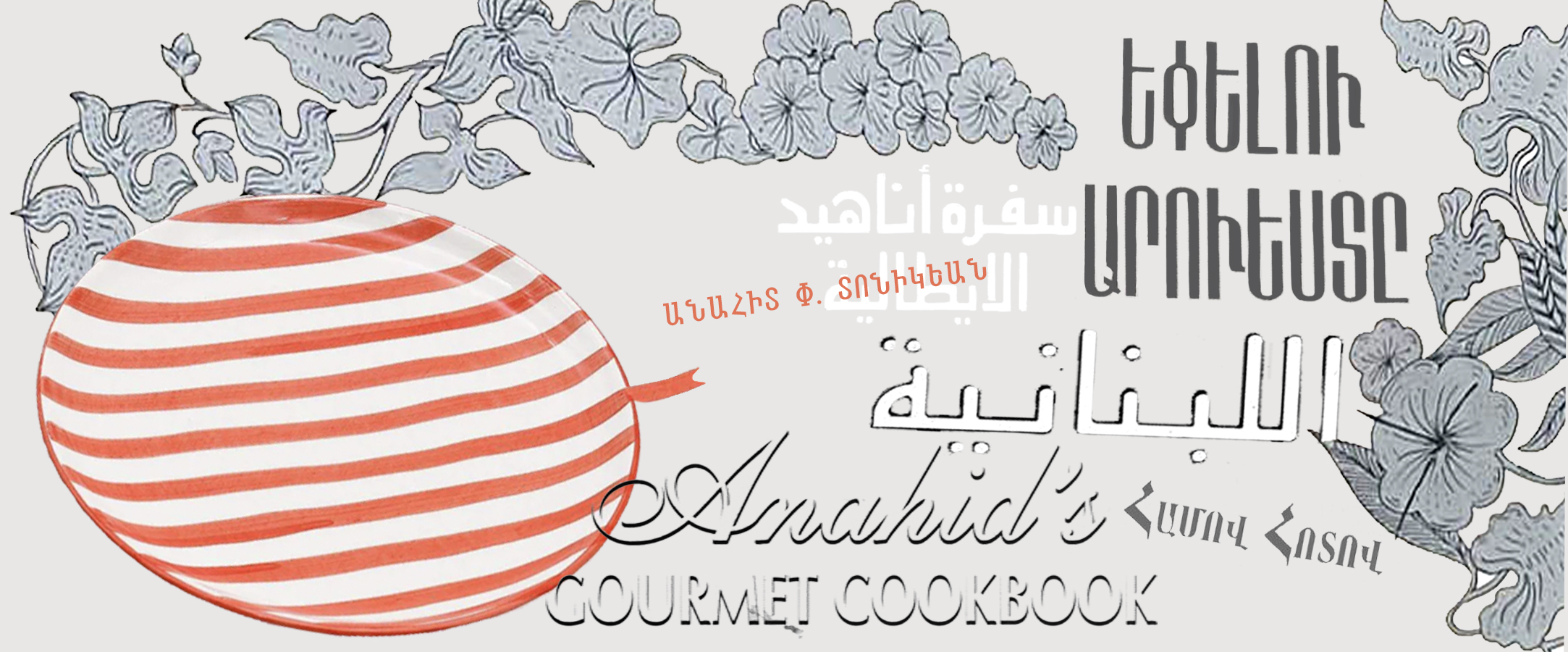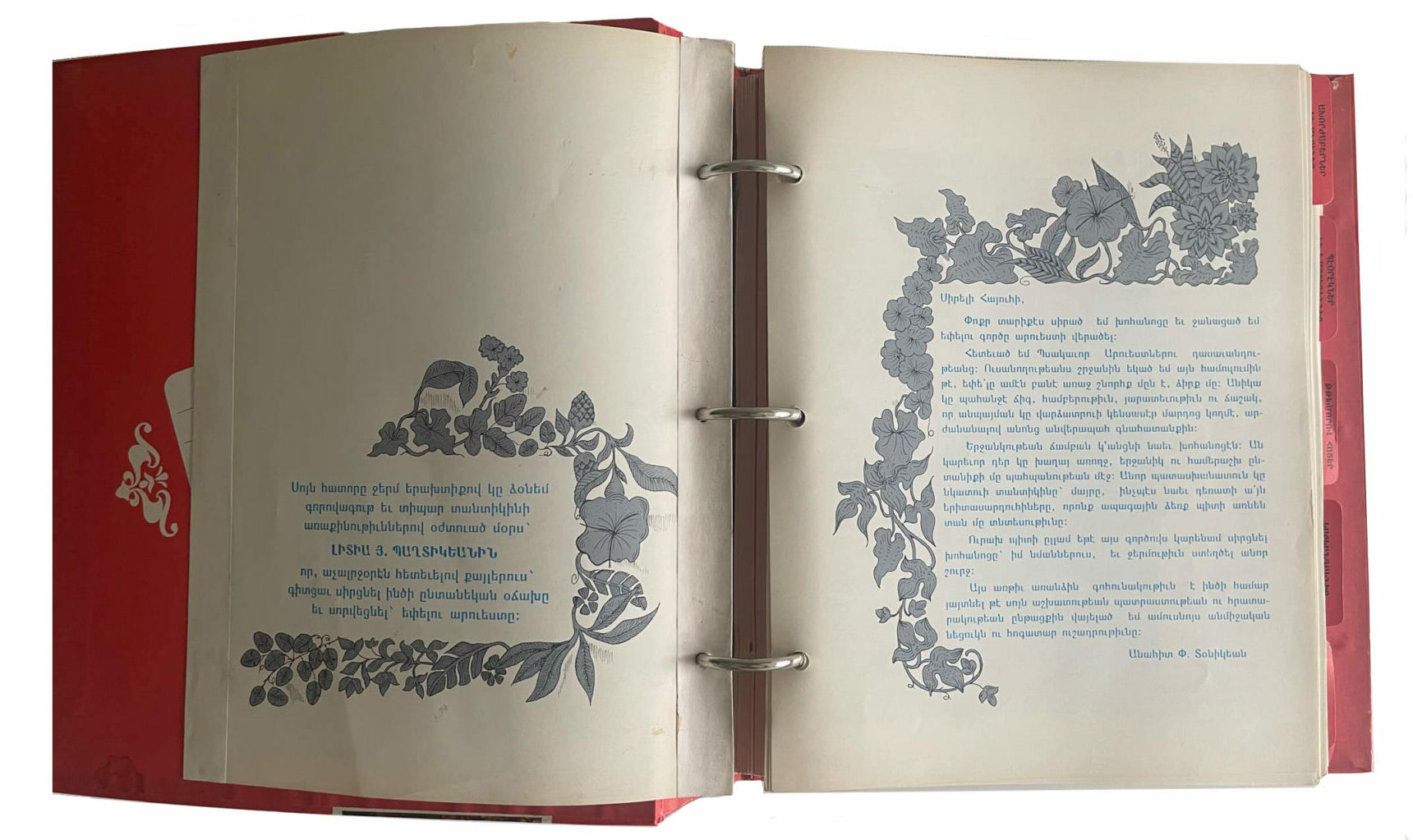
In 1960s Beirut, Anahid Doniguian would spend her afternoons as a child in the warm, enticing aromas of her family kitchen, carefully observing her mother as she artfully prepared an array of appetizing dishes and desserts. With each stir of a pot and fold of dough, Anahid unknowingly set the foundation for what would become her lifelong journey into the culinary arts.
Born in 1946, Doniguian has since become a renowned culinary expert driven by genuine love and devotion for cooking that she inherited from her mother—a skilled and meticulous cook. Her earliest inspiration came from watching her mother carefully jot down recipes in a notebook. “She wrote all the recipes herself under the candlelight,” recalls Doniguian, referencing Lebanon’s long history of power outages. “I have kept them as a souvenir to this day.” For Doniguian, her mother’s kitchen was more than a place to spend her afternoons; it was a formative school where she gained the foundational skills that would later define her career.
Growing up, Doniguian displayed artistic talent, excelling in piano and drawing. However, her true passion emerged in the kitchen. Following in her mother’s footsteps, she naturally developed a meticulous eye and an avant-garde approach to cooking. When she married in 1965, she brought along her mother’s treasured handwritten recipes, carefully preserved on loose sheets of paper.
When the Lebanese Civil War broke out in the 1970s, it was Doniguian’s mother who first encouraged her to channel her culinary skills into writing a cookbook. Motivated, she published her first cookbook in 1979, Hayouhi Khohanotse (The Armenian Woman’s Kitchen), a collection of simple recipes that appealed to local Armenian families. That same year, the Arabic version was released, named Halawiyat al Matbakh al Asri (The Modern Cuisine of Desserts), earning her recognition in Lebanon’s broader Arab community.
Building on this success, in 1980, Doniguian released her second cookbook, Yepelu Arveste (The Art of Cooking), which featured 900 recipes. The Arabic translation of the cookbook, titled Fan al-tabkh al-hadith (The Art of Modern Cuisine), was later published in 1990. These cookbooks quickly circulated in Lebanon as they served as prestigious gifts and became widely known as “Anahid’s book” for their variety, simplicity and vibrant photography. Passed down through generations, this cookbook was a milestone, solidifying her reputation across the country.

Her husband’s family-owned Doniguian Printing House, which printed and distributed her books, facilitated her publishing journey. “We printed 5,000 copies at that time, and the demand was skyrocketing,” says her son and current manager of the printing house Giragos Doniguian. The first run of the cookbook quickly sold out in Lebanon.
Compiling these cookbooks was a lengthy process that spanned over a year. “It took time to write the recipes, take the photos to display them in the book, and design the layout,” explains Giragos Doniguian.
To refine her culinary expertise, Anahid Doniguian attended Peter Kump’s New York Cooking School (now The Institute of Culinary Education) in 1985, one of the era’s most renowned culinary institutions. She later expanded her studies in Paris, immersing herself in the art of French cuisine. During the late 1980s, she honed her skills in various restaurant kitchens, learning elusive “secret tips” from seasoned chefs. “Chefs don’t share their secrets openly, so I learned by closely observing them,” Doniguian says. “Every chef has unique techniques and ingredients you won’t find in any cookbook.”
Inspired by her travels, Doniguian transformed her empty apartment in Antelias, a suburb of Beirut, into the Cookin’ Art Culinary Institute in the 1990s. For over 12 years, she taught cooking enthusiasts eager to master techniques from a wide array of cuisines, including French, Thai, Armenian and Chinese. This endeavor cemented her reputation as a culinary innovator and educator, further solidifying her status as an authority in the field.
In 2000, Doniguian published Hamov Hodov, a comprehensive cookbook featuring hundreds of recipes from Armenian, Middle Eastern, and international cuisines. Its Arabic version, Soufrat Anahid el Shahiyya (Anahid’s Gourmet Cookbook), was also released that year and found unexpected success in Saudi Arabia, the biggest market for her cookbooks, along with other Arab countries. “In Saudi Arabia alone, we made the most sales as we shipped up to 10,000 copies,” Giragos Doniguian explains. Motivated by her growing popularity in the Middle East, in 2004, the author released the English and French editions, Anahid’s Gourmet Cookbook and La Cuisine Gourmet d’Anahid, to appeal to larger audiences. “The French versions were mainly sold in France, and the English versions were sold in the U.S. and Canada in large quantities until this day,” he says.
Catering to her Middle Eastern audience, Anahid Doniguian expanded her repertoire in 2004 by publishing a series of Arabic-language cookbooks featuring recipes from diverse cuisines. These smaller volumes included titles like Soufrat Anahid al Loubnani (Anahid’s Lebanese Cuisine), Soufrat Anahid al Sini (Anahid’s Chinese Cuisine), and Halawiyat Anahid al Shahiyya (Anahid’s Delicious Sweets).
Helena Zakharia, a Palestinian Armenian chef, purchased a copy of Anahid’s Gourmet Cookbook as soon as it hit bookstore shelves in Al-Khobar, Saudi Arabia. A devoted admirer of her work, Zakharia gifted the cookbook to family members in the U.S. and France. “It’s an excellent cookbook—thorough, easy to follow, and precise,” Zakharia says, noting it as her favorite among Doniguian’s extensive collection.
Anahid Doniguian’s influence extended well beyond her cookbooks. In 2001, she became a food columnist for Laha Magazine, a prominent Arabic publication targeting women across the Middle East. Her recipes reached a broad audience, from Lebanon to Qatar, even drawing the attention of Sheikha Moza bint Nasser, wife of Qatar’s former Emir. Invited to the royal palace by Sheikha Moza, Doniguian was delighted to find Armenian dishes prepared using her recipes. “I was surprised by how much the royal family loved Armenian cuisine,” she recalls.
Her cookbooks’ popularity in Saudi Arabia led to an unexpected collaboration. In 2011, Doniguian assisted a group of Sheikhs in establishing Lusin, the Kingdom’s first Armenian restaurant. “They asked me to help set up the kitchen staff and menu using my Armenian recipes,” Doniguian explains. The restaurant’s success paved the way for additional branches in Riyadh, as well as an international expansion with a branch opening in London in 2022.
Reflecting on her accomplishments, Doniguian emphasizes the driving purpose behind her work: empowering generations of men and women to explore diverse cuisines. “Many people stick to one recipe,” she says. “Don’t they have the right to learn from a variety of cuisines?”
Through her remarkable career, Anahid Doniguian has elevated cooking into a powerful medium for cultural exchange. Her dedication has helped to preserve Armenian culinary traditions and introduce them to the world, cementing her legacy.

Issue N2
Design & Recycle







